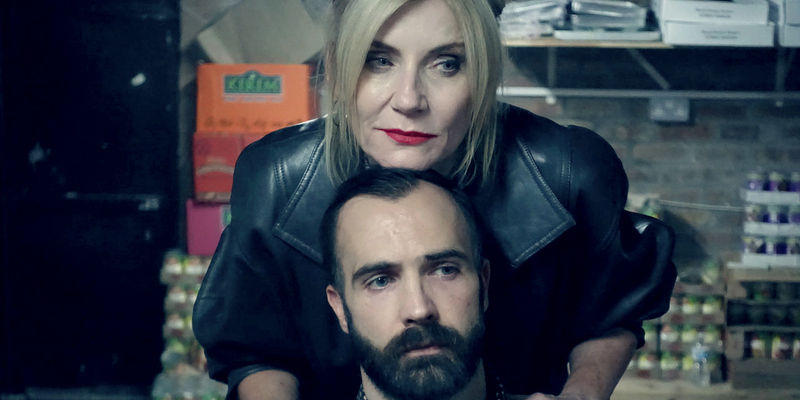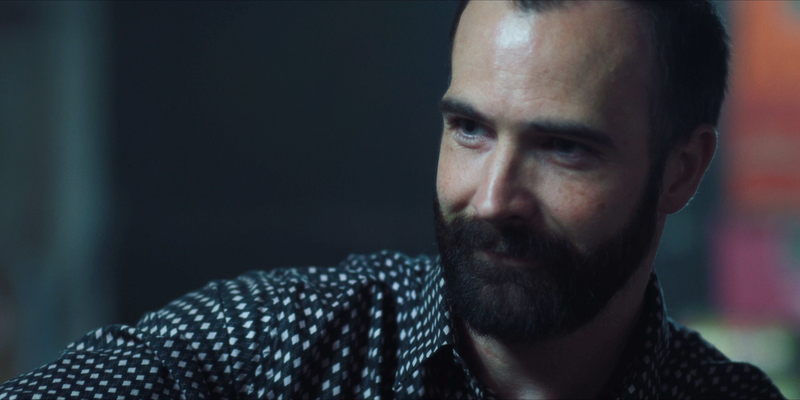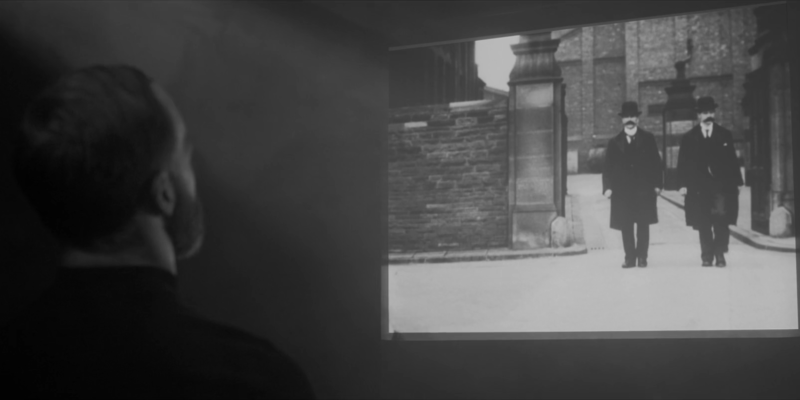
A recovering addict from a deprived Liverpool estate attempts to realise
his dream of becoming an actor.
Review by
Benjamin Poole
Directed by: Melanie Manchot
Starring: Stephen Giddings, Michelle Collins, Michael Starke,
Kent Riley, Paislie Reid, Thomas Sweeney

Couldn't have been more than five minutes ago I was scrolling Twitter
and up came a post from @ScrtDrugAddict asking "Is life just switching
addictions until we die?" Now, I don't follow the account - the tweet
appeared on the "for you" feed - but it turns out that perhaps
there is something in the pernicious algorithms of the platform, as the
plaintive rhetoric of the question certainly struck a chord with me - a
person of, if not addiction, then certainly obsession. What is existence
without mania? What is life without an abstract to devote it to? A void,
I reckon. Although you do begin to worry, don't you, about the point
where benignly doing something you like a lot curdles into a habit: a
pursuit that is joyless but an intrinsic aspect of your being. The knife
edge where perfecting the vodka martini becomes alcoholic dependency;
when a relationship becomes toxic; of what happens a week after people
begin smoking cigarettes. Or, accordingly, the most addictive pursuit of
all: gambling.

It is easy to understand why gambling is so enthralling. So much going
on with the buzz of the risk, the cruel hope, the sense that the odds
can be overcome. There no such thing as a sure bet and so the rush is in
the process. Unlike the repetitive impulse of drugs, the experience of
gambling is always dangerously fresh and exciting, and even worse, tied
into potential answers for the same dire situations which the addiction
has caused. Drugs may be a release, but the big score can be a
solution... (I'm saying all this having hardly ever gambled in my life
and only then on Eurovision, but there is a disastrous history of it in
my family, so I have thought about it a lot over the years if that
counts). It is disingenuous that mainstream cinematic depictions of
gambling are often constructed within glamourous contexts (Vegas, etc),
with attendant iconography of poker tables, chips, big wodges of cash:
the inherent risk of the process is a Todorovian structure within
itself, too (I knocked
Molly's Game
on last night - where big game poker is a backdrop for Jess Chastain's
Hollywood actualisation). A representation far removed from the lived
experience, which is scarcely presented within narrative cinema.
Melanie Manchot and co-writer Leigh Campbell's fiercely
original Stephen is however a profoundly intelligent,
effective and challenging portrayal of gambling, along with the social
ills inevitably associated with the addiction. The film eschews typical
narrative structures, and instead affects a montage of historical
footage, documentary style and re-enactment to retell the story of
Stephen Giddings (the actor) as he auditions for the part of
Thomas Goudie, the subject of the very first filmed crime
reconstruction. A Brechtian rug is first pulled in the post title
sequence wherein we painstakingly follow Stephen (a Merseyside Will
Arnett) through the council estate where he lives to the local dive bar
to watch him compulsively deposit coins into a fruit machine. After a
set-to with another character, the camera turns to reveal a panel of
filmmakers, who comment on his performance – "What you did earlier with
the fruit machine was brilliant." The character-within-the-story becomes
the character-of-actor-within-the-enveloping-narrative: a mimetic
overture compounded by the filmmakers' use of amateur performers and
real-life addicts.

Manchot is careful in her presentation of this sensitive material, never
sensationalising her ersatz cast and instead creating a platform for
these voices, including professional actors such as
Thomas Sweeney (who also shares his experience of alcoholism
within the filmed group sessions - when you're an alcoholic a bar is
"like a Christmas tree"). The switches between documentary
verisimilitude and constructed narrative are deliberately
disorientating, especially so as the sequences with Stephen as
character are so emotively involving (I'm thinking of a horribly
convincing fight over a fruit machine...). During
Stephen we find ourselves dramatically gripped as Stephen
slips further and further into hot water, yet also challenged by the
otherwise objective portrayals and their purposeful lack of easy
sentiment.

It is a heady mix, and one which thrills with its bravura creativity. An
artist by profession, Manchot's film has the multi-media mien of an
installation piece, where the meta lens is a cracked mirror, reflecting
the complex and frustrating experiences of those at the hard end of
addiction. At times there are certain flourishes that detract from its
overall impact, such as cutaways to superfluous interpretive street
dance, but beneath Stephen's shifting layers of fact and fiction beats a deeply compassionate
heart.

Stephen is on UK/ROI VOD now.

